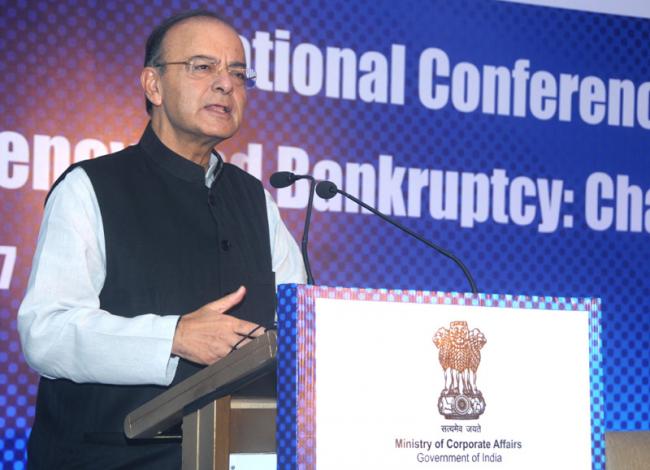
Central government releases Quarterly Report on Public Debt Management for the second quarter
New Delhi, Dec 5 (IBNS): During Q2 FY18, the Central government issued dated securities worth Rs. 1,89,000 crore (32.68 per cent of BE), according to the July-September 2017 (Q2 FY 18) Report on Debt Management.
This is higher than Rs. 1,68,000 crore (29.0 per cent of BE) reported in Q1 of FY 17, taking the gross borrowings during H1 FY18 to Rs. 3,57,000 crore or 61.68 per cent of BE, vis-a-vis 56.8 per cent of BE in H1 FY 17.
Auctions of both, Government dated securities and Treasury Bills during Q2 of FY18 went over smoothly, according to report.
The weighted average maturity (WAM) and weighted average yield (WAY) of the issuance made during Q2 FY18 was 14.58 years and 6.77 per cent, respectively.
The liquidity in the economy remained in surplus, due to demonetization, during the quarter, according to the report.
The cash position of the Central government during Q2 of FY18 was somewhat stressed and it was required to resort to W & M advances from RBI on a few occasions.
Moreover, through cash management guidelines, attempt was made to time expenditure as per receipt trends.
Based on the assessment of prevailing and evolving liquidity conditions, the Rserve Bank of India (RBI) conducted sale of Government securities under Open Market Operations for an aggregate amount of rupees 600 billion during the quarter.
The Public Debt (excluding liabilities under the ‘Public Account’) of the Central Government provisionally increased to Rs. 65,65,652 crore at end-Sep 2017 from Rs. 64,03,138 crore at end-June 2017.
Internal debt constituted 93.0 per cent of Public Debt as at end-Sept 2017 while marketable securities accounted for 82.6 per cent of Public Debt.
About 27.8 per cent of outstanding stock has a residual maturity of up to 5 years at end – Sept 2017, which implies that over the next five years, on an average, around 5.56 per cent of outstanding stock needs to be repaid every year.
Thus, rollover risk in the debt portfolio continues to be low.
G-Sec yields showed a falling trend till August 3, 2017 but an increasing trend was seen thereafter, the report said.
Yields initially softened due to increase in FPI limits by RBI to Rs. 2.42 lakh crore in G-Secs and Rs. 0.33 lakh crore for SDLs under the revised medium term framework for investment by FPIs.
Yields, however, started hardening from beginning of August due to rise in inflation (WPI 3.24% in August 2017, 2.60% in September 2017 and CPI 3.28% in August 2017 as also in September 2017.
Rise in trade deficit in August 2017 ($11.7 bn in Aug’17 vs. $7.7 bn in Aug’16) and adverse Dollar-Rupee movement (Rupee depreciated almost Rupees 2 in a month) further added to the pressure.
Crude oil prices jumped from $ 47 in June to $59/barrel on September 27, 2017 putting pressure on balance of trade and BoP position and its likely effect on inflation.
Concerns over GST revenues (after net of refund claims) also affected yields.
The trading volume of Government securities on an outright basis during Q2 FY 18 increased by 10.20 per cent over the previous quarter.
Since April-June (Q1) 2010-11, Public Debt Management Cell (PDMC) (earlier Middle Office), Budget Division, Department of Economic Affairs (DEA), Ministry of Finance, is bringing-out a Quarterly Report on Debt Management on regular basis.
Support Our Journalism
We cannot do without you.. your contribution supports unbiased journalism
IBNS is not driven by any ism- not wokeism, not racism, not skewed secularism, not hyper right-wing or left liberal ideals, nor by any hardline religious beliefs or hyper nationalism. We want to serve you good old objective news, as they are. We do not judge or preach. We let people decide for themselves. We only try to present factual and well-sourced news.







